AI Summary
Are you looking for the best AI plugins for WordPress?
Artificial intelligence is rapidly advancing, and it’s already proving to be highly impactful in WordPress. More and more WordPress plugins are relying on AI in some way today to help you run your online business activities better with less effort.
We’ve tested a bunch of plugins with AI capabilities and were super impressed by a few of these. In this post, we’ll share our favorite AI plugins for WordPress so you can start taking advantage of them right away.
Best AI Plugins for WordPress
Here’s our list of the best AI-powered plugins you can use on your WordPress website.
| AI Plugin 🤖 | Ideal For 🎯 | Pricing 💰 |
|---|---|---|
| All in One SEO | On-page SEO with AI-assisted titles and meta description generation | $199.60/yr |
| WPCode | Creating code snippets to improve website functionality | $199/yr |
| 10Web AI Assistant | Content generation directly in Gutenberg editor | Free + paid options ($10/mo) |
| Uncanny Automator | Connecting WordPress plugin with OpenAI for powerful automation | $249 /yr |
| Voicer | Text-to-speech conversion for accessibility | $20/yr |
| Media File Renamer | Bulk renaming of media files with AI suggestions | $29/yr |
| Dall-E Image Generator | Inserting AI-generated images into posts | $99 |
| Tidio | Chatbot services for sales, lead collection, and customer support | $24.17/mo (billed yearly) |
To learn more about why we like these plugins, read on below.
1. All in One SEO (AIOSEO)

All in One SEO is one of the most popular plugins for doing SEO in WordPress. While the plugin is highly rich in SEO features, it’s at the top of our list because of its AI-based headline generation abilities.
AIOSEO offers native integration with ChatGPT, which allows it to offer SEO title and meta description suggestions for your post while you’re editing it in WordPress. It’s a simple convenience, but the value it offers in terms of saving time is immense.
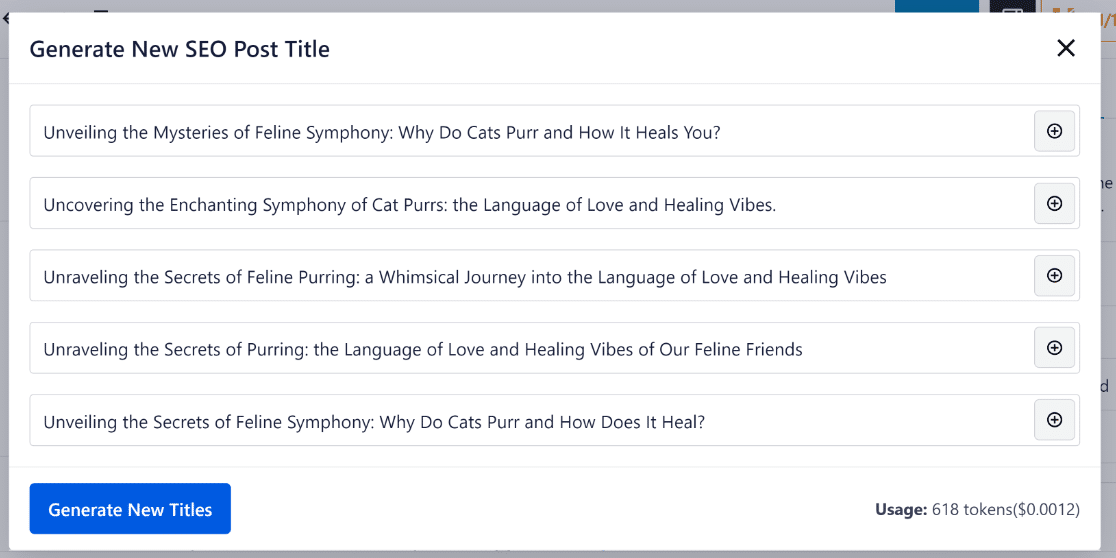
For instance, I regularly use this feature to find inspiration for SEO titles for our blog posts. AIOSEO has made this process faster with its title generation functionality.
In our experience, the true value of this feature becomes more apparent when we’re doing a quick sprint of updating old articles with new information and SEO titles. With a single click, you can get high-quality ChatGPT suggestions for your titles in WordPress and make useful changes that can help you rank higher in Google Search.
⚡ Need more ideas for leveraging ChatGPT to help with SEO? Try using these simple but effective AI prompts.
Apart from its AI capabilities, AIOSEO is a great asset to your SEO strategy with features like schema generation, on-page SEO analysis, and internal linking reports.
Most other SEO plugins only count the number of internal links. But AIOSEO goes beyond that and shows you a complete breakdown of internal links across your whole site.
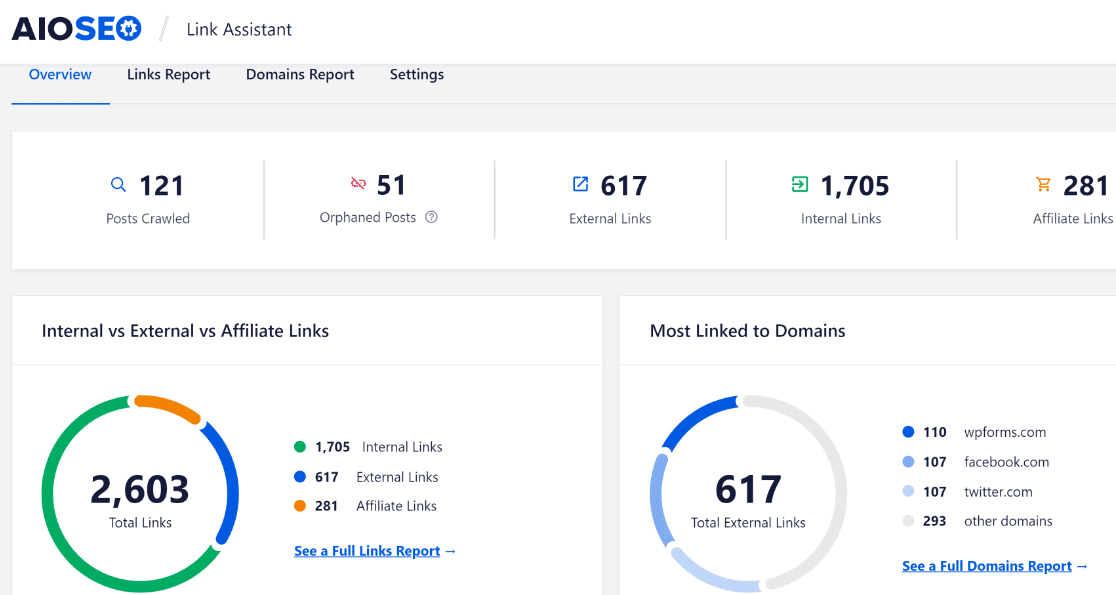
Overall, AIOSEO is an excellent investment if you’re looking or the best WordPress AI plugin to improve your SEO.
2. WPCode

If you want to add functionality to your website, code snippets are a smart way to do that without the bloat of numerous plugins. WPCode is the best when it comes to creating and managing code snippets, and with WPCode AI, coding is breeze for everyone, no matter your skill level.
All you need to do is describe what you want the code to achieve and WPCode AI will generate the code for you. You can always fine-tune it or change it entirely if you need to.

We found it quick and easy to use, and the code was easy to add.
It also includes auto-insertion and conditional logic, which makes maintenance much easier.
WPCode AI is definitely worth checking out. From beginners to seasoned developers, everyone can benefit from this feature. It saves time and simplifies something that can be mystifying to many. That’s a win in our book.
3. 10Web AI Assistant
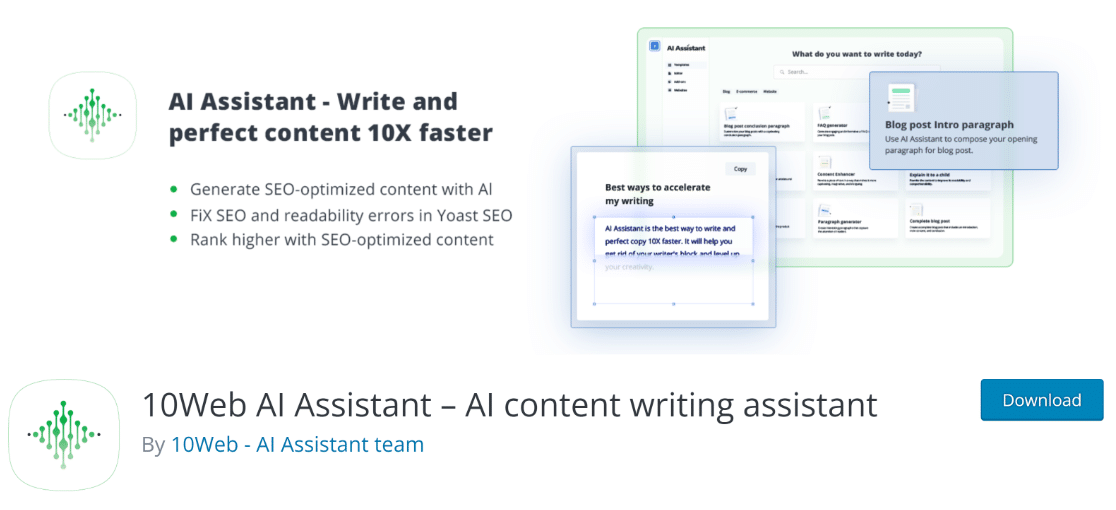
For content generation, 10Web AI Assistant is one of the most promising plugins we’ve tested. This plugin works seamlessly with the Gutenberg block editor, allowing you to add a complete AI generated long form post on your site.
We really like the fact that you can generate content in a very structured way with this plugin. When you start writing a new post, 10Web only needs you to enter a title for your post and then generate an outline based on it.
You can then make edits to the outlines and add introductions, paragraphs, and conclusions with just a single click.
We found writing with this plugin more convenient than using ChatGPT because 10Web integrates perfectly with your block editor, so you don’t have to leave your site during the content creation process.
However, the content it produces tends to be a bit generic, which is to be expected with AI generated content. The best way to use this plugin is by leveraging its AI to produce content for small specific sections, like the introduction, conclusion, or product descriptions.
It’s also pretty good at paraphrasing existing text. If you want to rephrase a piece of your writing, 10Web can be quite useful.
4. Uncanny Automator

Uncanny Automator lets you automate all kinds of WordPress tasks. Essentially, the plugin serves as a bridge between WordPress plugins and apps, allowing them to communicate with each other.
One of its many supported integrations is OpenAI. This allows you to take advantage of different OpenAI machine learning and language models, including GPT-3 and Da Vinci for handling different types of WordPress tasks.
You can use it to generate confirmation emails for form submissions, WooCommerce orders, and more. That’s just one example. You can also create online course pages, forum comments, support responses, and a lot more.
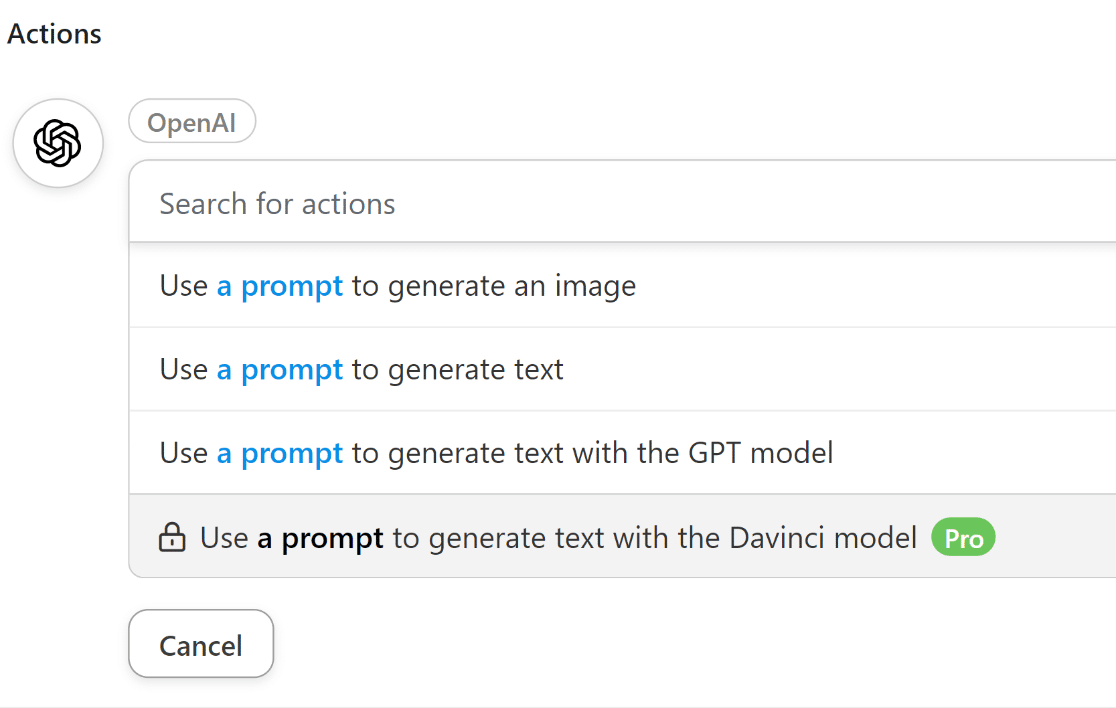
The versatility of Uncanny Automator is truly incredible. In our testing, we encountered no difficulties setting up triggers and actions using OpenAI. All integrations worked as intended with no errors.
Overall, we strongly recommend Uncanny Automator if you want to streamline your website operations using AI technology.
5. Voicer
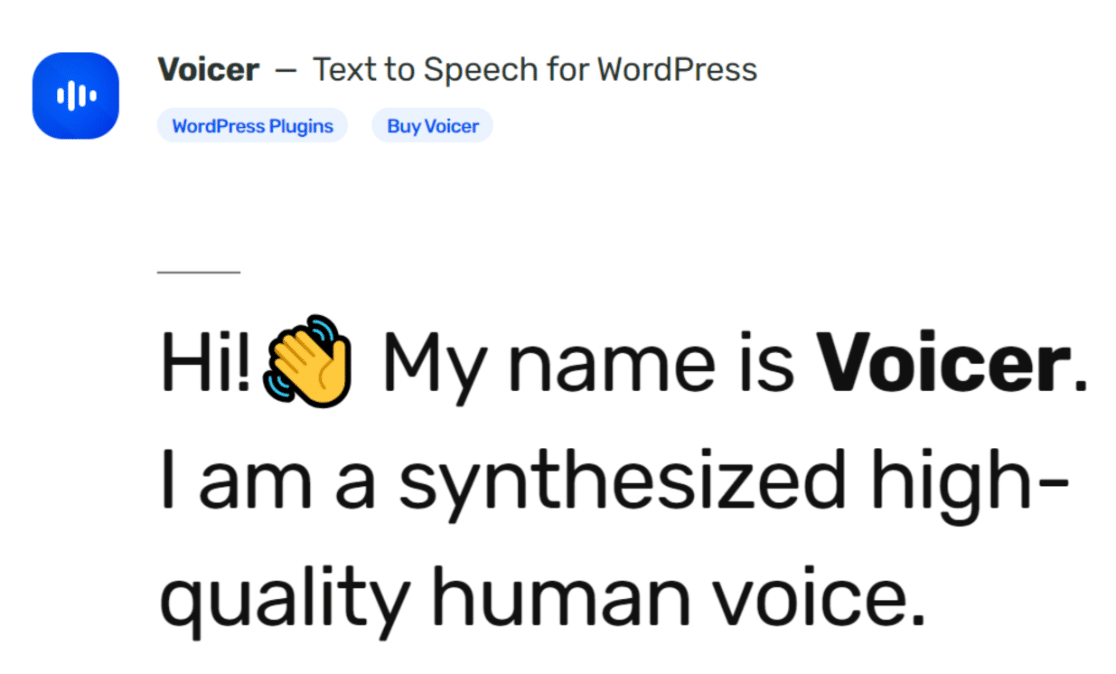
Voicer is an incredible plugin that converts text into speech for vision-impaired people. It’s an excellent use of natural language processing (NLP) algorithms to make your WordPress site more accessible.
Powered by Google’s Cloud text-to-speech API, Voicer adds a play button at the top of any piece of highlighted text. Clicking on the play button will initiate speech conversion in a very human-sounding voice. This could be a single word, a full sentence, or a whole paragraph.
We were really impressed with how human-sounding the voice is, making for a fantastic user experience.
The best part is that Voicer supports over 45 languages, so you’ll have no problems even if you’re a multilingual site with a global audience.
And you can choose from 275+ different voices. To make the voice sound even more human, you can add pauses of varying lengths in your content. But even without adding pauses manually, the quality of the speech was fantastic during our testing.
The only slight complaint we have is that for larger pieces of text, Voicer can take a while to generate the speech for your selected text.
We also think that the speech play button should appear dynamically in an area of the screen currently visible to the user. The play button only appears above the topmost piece of text in your selection, so you’ll have to scroll all the way up if you’re trying to convert multiple paragraphs into speech.
6. Media File Renamer
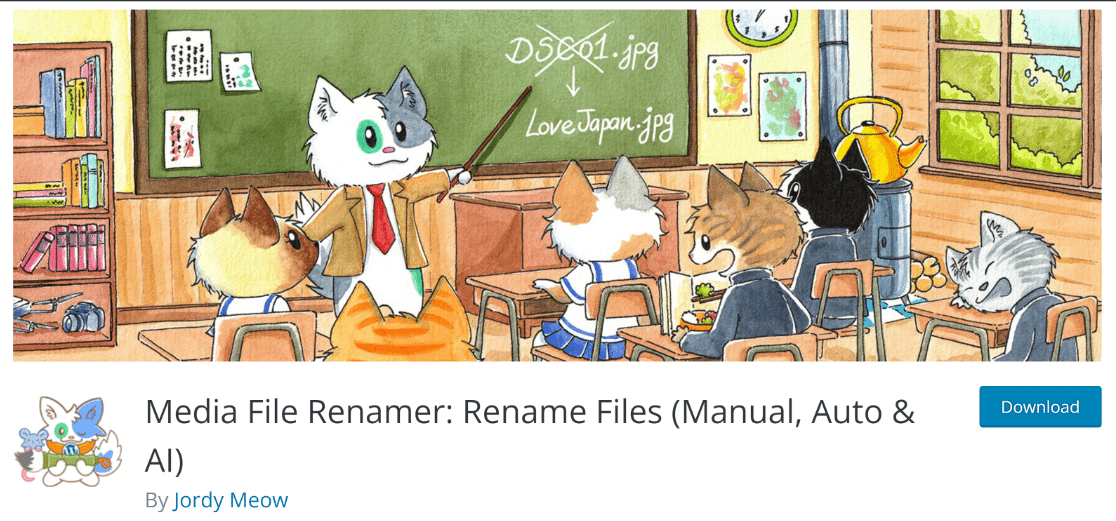
Media File Renamer is one of the many AI tools by Meow Apps. And it’s really powerful.
The purpose of the tool is simple – allowing you to rename your files in bulk with suggestions from AI. The plugin supports three different ways for file renaming.
You can rename a filename manually by updating its title, auto-update the filename based on the title, or use AI suggestions for the filename with a ChatGPT integration.

We love this tool because it’s a massive time saver. A lot of the time, files uploaded to WordPress have gibberish names, which isn’t ideal for SEO and also makes it harder to locate your images within your own site.
But with Media File Renamer, you can bulk edit filenames in your entire media gallery and also immediately rename files as soon as they’re uploaded on your site.
However, we strongly recommend backing up your site and exercising caution before renaming files on your site.
Changing the names of files in the WordPress database can sometimes cause your website to break. But if you’re backing up your site regularly, you have nothing to worry about.
7. Dall-E Image Generator
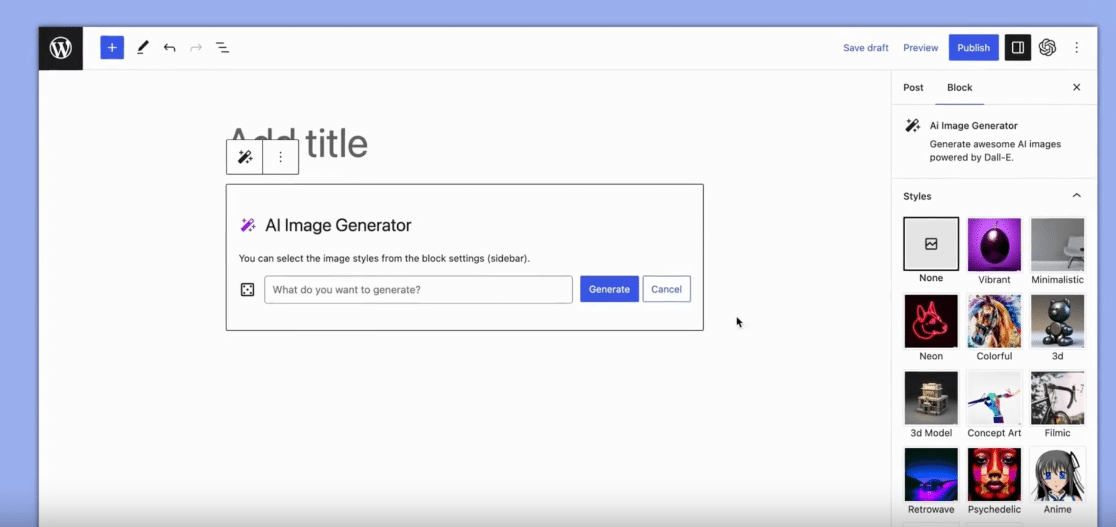
Dall-E Image Generator is a super handy application of OpenAI’s image generation technology.
This plugin adds a block to your Gutenberg editor in WordPress, which you can use to insert AI-generated images anywhere in your post. Compared to searching for stock images manually online, using Dall-E can give you a massive productivity boost.
The Dall-E block in WordPress accepts text prompts for generating your requested image. Once it generates an image, you can try different variations of the image from the toolbar.
We think Dall-E Image Generator offers great value for writers who want to focus more on writing and leave the images to the AI.
At the same time, we think there are clear limitations with AI image generators in their current stage. That’s because the kind of images that AI generates aren’t always ideal for blog writing, as these often take the form of digital paintings.
8. Tidio
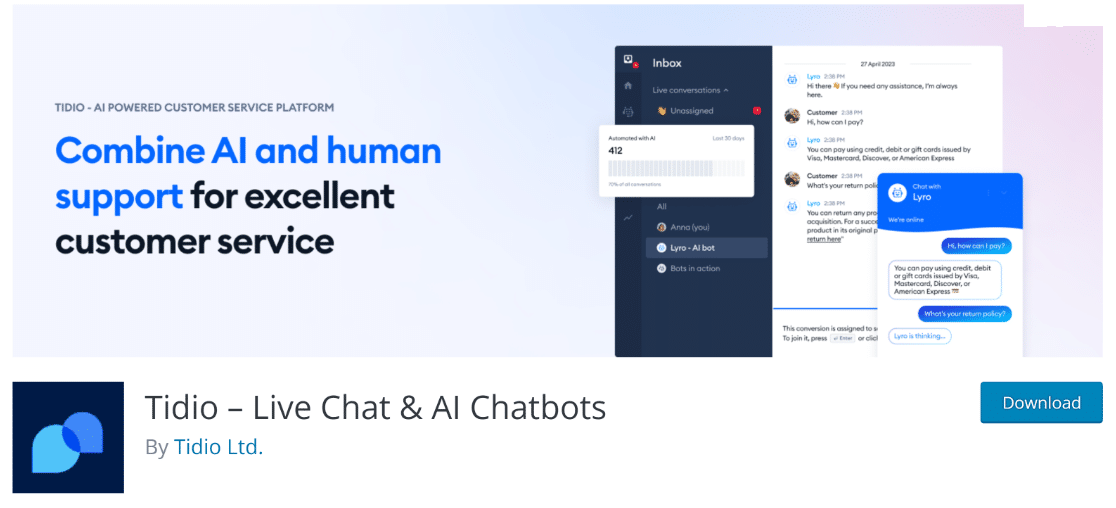
Tidio is a chatbot service that integrates flawlessly with WordPress. The AI capabilities of this chatbot are optimized for three important functions: increasing sales, collecting leads, and solving customer problems.
We were impressed by the variety of ready-made chat templates included in Tidio. These templates are great for initiating different conversations based on different triggers and user segments. For instance, you can start welcome chats with new visitors to improve user engagement, send post purchase discounts to customers on your eCommerce store, and more.
Tidio includes an AI bot called Lyro that can help solve customer problems. It learns about problems and their solutions based on the FAQs published on your site and does a fairly good job of addressing common questions.
During a live chat, you have the option of manually responding to visitors, select from a library of canned responses, and having the AI generate and fine-tune your messages for you. That makes it a great collaborative effort between you and your AI, greatly improving your efficiency and the accuracy of responses.
Overall, Tidio is one of the best AI chatbots you can use on your WordPress site.
WPForms + AI
We know you’re here (and thanks for being here!), so maybe you know this already. But maybe you don’t. Here at WPForms, we also have some pretty cool AI features you might want to check out.
Have you ever been creating a form and thought to yourself, “I wish this list of options would just write itself because I don’t know what I should include?” Us too, and that’s why AI Choices is amazing.
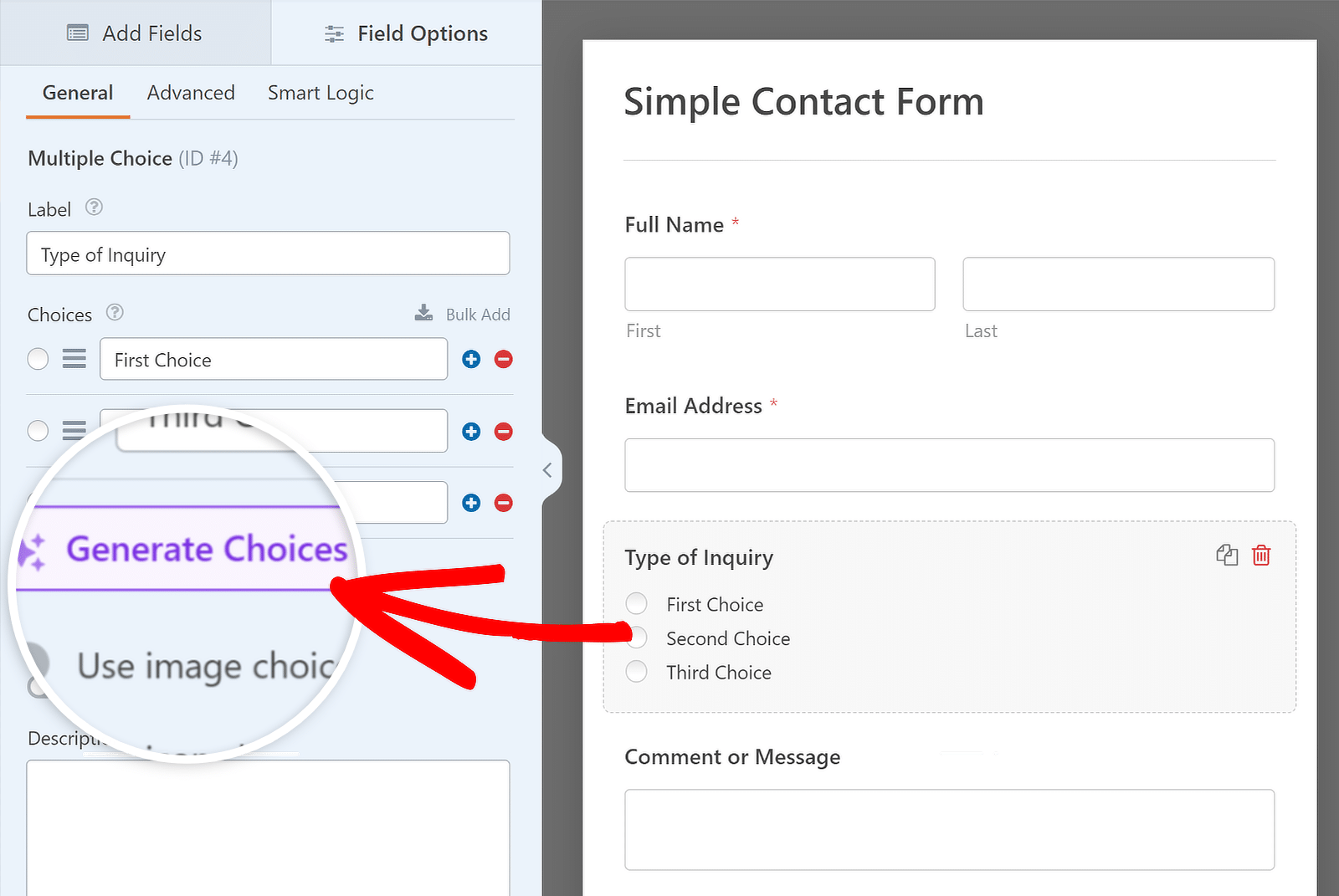
You can give it a few details about the kind of list you want to create and it will create the list of options for you. It’s even great for generating lists that just take a long time to manually input, like a list of every state in the US. Learn more about AI Choices.
Going a step beyond that, WPForms can actually create entire forms for you using AI. It’s true! You can write a few words about the kind of form you want and watch as it appears like robot magic.
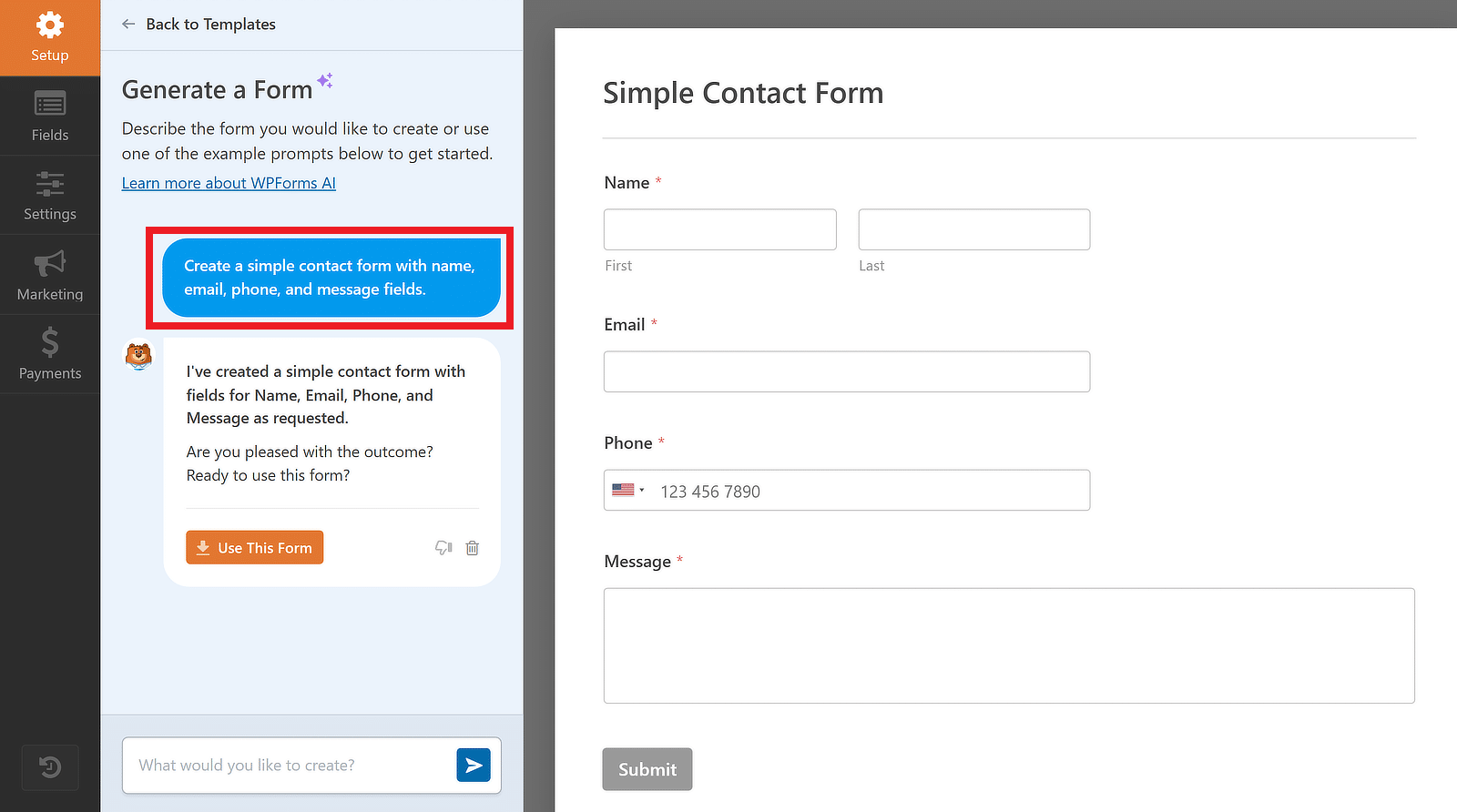
And if it isn’t quite what you want? Keep chatting to fine-tune. When you’re satisfied, click on the Use This Form button to load it in the form builder. It might just be the easiest thing you do all day. Learn more about WPForms AI.
FAQs on Best WordPress AI Plugins
Here are some of the most commonly asked questions about the best AI plugins for WordPress sites.
What Can AI Plugins Do for My Business?
AI plugins can help your business in various ways. For instance, WordPress plugins can help bloggers with content writing and gain inspiration with content recommendations, assist with CSS, PHP, and HTML code snippets for custom website development, generate images for your graphic design, offer customer support in the form of chatbots, and a lot more.
Does WordPress Have a Chatbot?
If you need a chatbot, you have various options for adding one to your WordPress site. Tidio is a great option, but you can also use AI Engine, which uses an OpenAI integration to add a chatbot to your website.
How to Use OpenAI API in WordPress?
There are many WordPress plugins that rely on OpenAI API including AI Engine, Uncanny Automator, Formidable Forms, and more. These plugins bring different OpenAI machine learning models to your WordPress site, including GPT-3, Da Vinci, and others. All you need is to have an active OpenAI account and available credits in order to connect these plugins with the OpenAI API.
Can I Use AI-Generated Content On My Website?
Yes, you can use AI-generated content on your website to create blog posts and landing pages. To make this easier, you can take advantage of tools like 10Web, WordLift, Uncanny Automator, and other WordPress tools that use GPT-3 and other AI technologies to generate content right within your WordPress site. However, AI is still a developing technology, and its usage in terms of SEO is a bit of a gray area. It’s best to exercise caution and use AI-generated content strategically with a good mix of human-written content.
Next, Make Your Website Smarter
The best thing about WordPress is the wide range of functionalities it offers for automating various components of your website and making it smarter.
We have several roundup posts dedicated to useful integrations and automation for WordPress that you may want to read:
- Best WordPress Marketing Integrations
- Best WordPress Automation Tools
- WPForms WooCommerce Integration
- Best ChatGPT Plugins for WordPress
- Best Shopify Alternatives & Competitors
- AI Tools For Small Businesses
Ready to build your form? Get started today with the easiest WordPress form builder plugin. WPForms Pro includes lots of free templates and offers a 14-day money-back guarantee.
If this article helped you out, please follow us on Facebook and Twitter for more free WordPress tutorials and guides.



